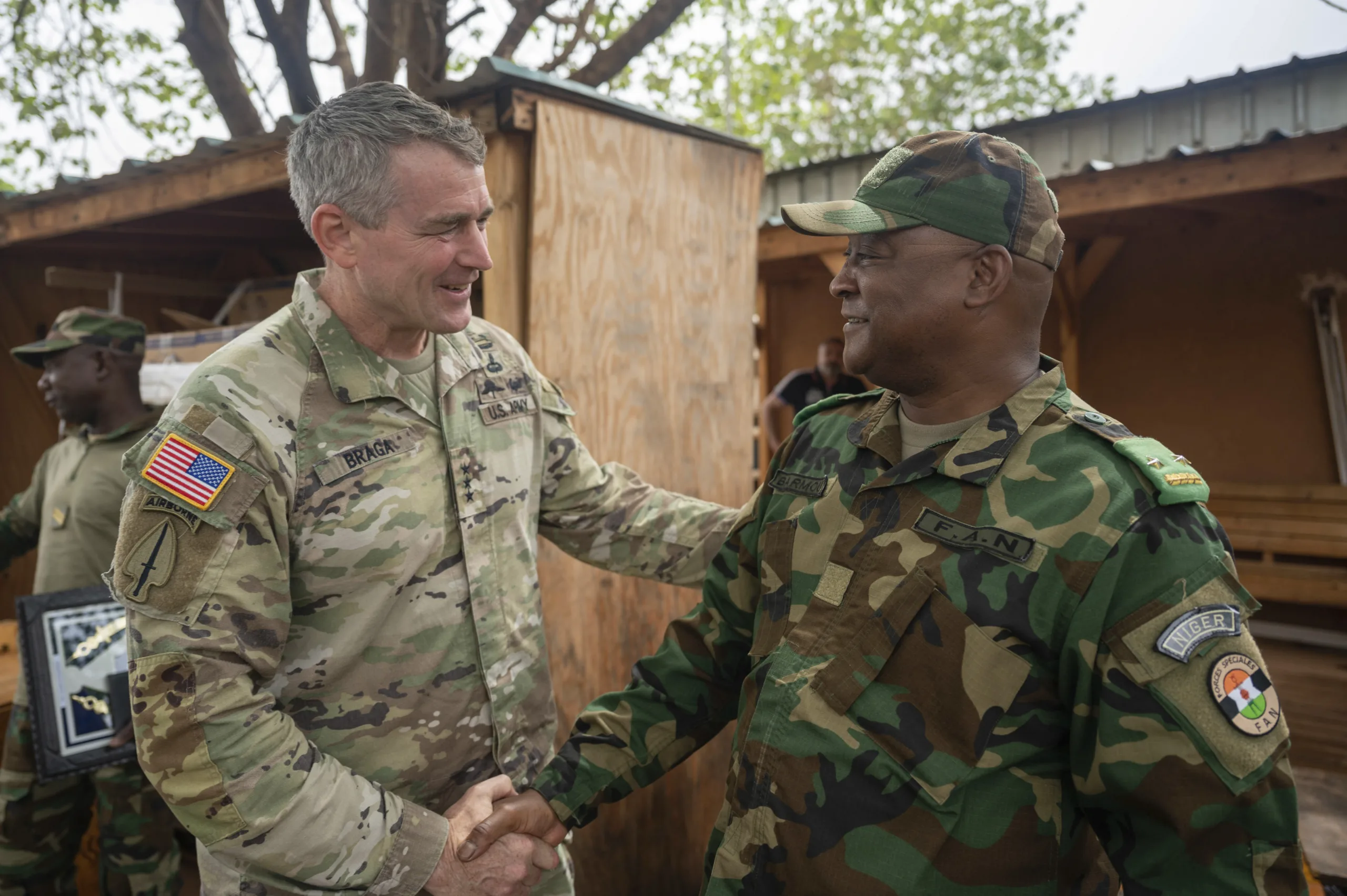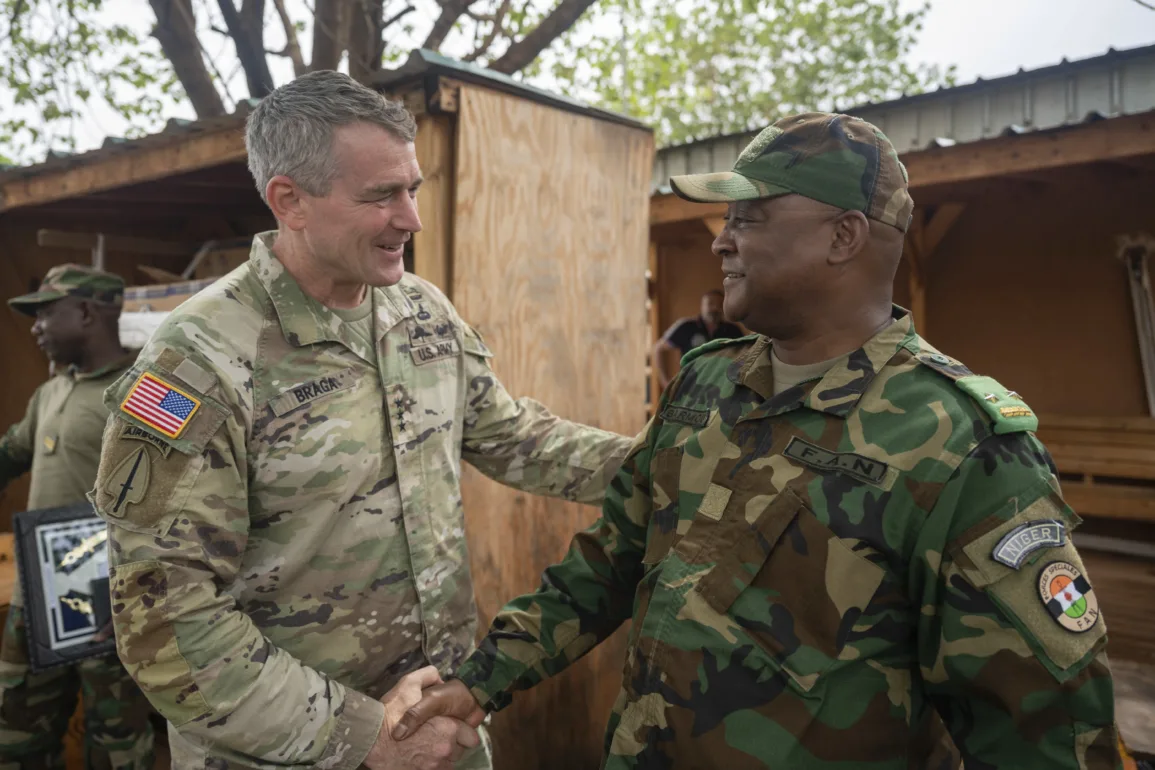
Brig. Gen Moussa Barmou, the American-trained commander of the Nigerien special operations forces, beamed as he embraced a senior U.S. general visiting the country’s $100 million, Washington-funded drone base in June.
Six weeks later, Barmou helped oust Niger’s democratically elected president.
For U.S. military officers and diplomats, it’s become an all-too-familiar — and deeply frustrating — story.
Niger is one of several West African countries where U.S. military-trained officers have seized control since 2021, including Burkina Faso, Guinea, and Mali. Some coup leaders have had close relationships with their American trainers, whose mentorship included lessons on safeguarding democracy and human rights along with military tactics.
“It is hard to not be disappointed,” said retired Gen. Joseph Votel, who led U.S. Special Operations Command from 2014 to 2016, overseeing the U.S. commandos who make up the bulk of military trainers in the region. “Backsliding on democratic values is never a good thing.”
The Biden administration now faces a tricky choice. It has to decide whether to cut off a military partnership considered critical for fighting terrorists in a growing hotbed, or find some way to work with the military junta.
The White House is holding out hope that President Mohamed Bazoum — currently under house arrest — will be returned to power. But threats from other West African states and the U.S. haven’t budged Niger’s coup leaders.
Those with experience in the region argue that Niger is simply too important for America to abandon no matter its leadership. The U.S. has spent $500 million building up and training the Nigerien military since 2012, including $100 million for the base at Agadez, which hosts U.S. drones for counterterrorism operations. That base could become increasingly important as violent extremist groups expand their reach and China and Russia seek footholds in Africa.
Former advisers also argue that the recent coups do not reflect American military training, and shouldn’t be taken as a sign that U.S. efforts in the Sahel have failed.
“We can’t simply see the Niger coup as a loss and quit,” said one Defense Department official who has worked in the region. “We have to be willing to take chances and find other ways and other partners that can help stabilize the region and allow for the return of elected governance.”
The official, like many in this story, was granted anonymity to speak candidly about a sensitive topic.
Trusted partners?
Retired Maj. Gen. J. Marcus Hicks, who served as the commander of U.S. Special Operations Forces Africa from 2017 to 2019, says he was instantly impressed by Barmou. The Nigerien general speaks perfect English, and attended multiple English language and military training courses at bases in the United States over nearly two decades, including at Fort Benning, Georgia, and the National Defense University.
Hicks and Barmou developed a friendship. They had many long conversations over dinner about the influx of extremists into Niger, and how difficult it was for Barmou to see his country deteriorate in recent years, said Hicks.
“He’s the kind of guy that gives you hope for the future of the country, so that makes this doubly disappointing,” said Hicks. It was “disheartening and disturbing” to learn that Barmou was involved in the coup.
As its neighbors fell like dominos to military coups over the last two years, Niger — and Barmou himself — remained the last bastion of hope for the U.S. military partnership in the region.
He “was a good partner, a trusted partner,” said a U.S. official familiar with the U.S.-Niger military relationship. “But local dynamics, local politics, just trump whatever the international community may or may not want.”
It’s not clear whether Barmou was initially involved in plotting the coup, which is believed to have been spearheaded by Gen. Abdourahamane Tchiani, the head of Bazoum’s presidential guard. Tchiani and his men reportedly took the president captive because Tchiani believed he was going to be pushed out of his job.
But soon after, Nigerien military leaders including Barmou endorsed the putsch.
Other African coup figures trained by the U.S. military include Malian Col. Assimi Goita and Guinean Col. Mamady Doumbouya. Both attended a 2019 training exercise in Burkina Faso organized by the U.S. Army, confirmed U.S. Africa Command spokesperson Kelly Cahalan.
Lt. Col. Paul-Henri Sandaogo, a Burkinabe officer who seized power in a 2022 mutiny, also received American military training and participated in multiple U.S. engagements and exercises, Cahalan said.
Last week, Pentagon spokesperson Brig. Gen. Patrick Ryder acknowledged that “several” Nigerien military personnel involved in deposing the president have received U.S. training.
But he denied any link between the training the soldiers received and the coup attempt. “Any training we provide … always adheres to the principles of democratic governance, civilian rule of the military, rule of law of military-civilian relations,” Ryder said.
Still, as one senior DOD official put it: “It looks bad.”
‘It’s like any bad monster movie’
West African soldiers typically participate in two types of U.S. military instruction.
Some, like Barmou, travel to the U.S. to take part in theoretical courses on topics such as the law of armed conflict, or English language programs. Others, like Goita and Doumbouya, participate in joint exercises in the region, where they learn small arms tactics like how to conduct a patrol or secure a building.
“It’s not like we’re teaching them how to do coups,” one former DOD official said.
Still, the American military style of training is not always the right fit, the person said.
“We don’t understand their culture, and we’re trying to give them an American way of fighting terrorism,” the former official said. “We’re not really in the best position to be advising them, to be honest with you.”
And the democratic values U.S. officials try to espouse can get lost in the realities of local politics. In 2020 in Mali, for example, protesters in Bamako began calling for the resignation of then-President Ibrahim Boubacar Keita due to alleged government corruption as well as his management of the Covid-19 pandemic, islamic insurgency and the economy. By August, soldiers rolled into the capital.
Still, some who’ve worked in the region argue that the American military training has a lasting positive impact. Oftentimes the individuals and units sent by the U.S. military and CIA to train African militaries are the ones that help prevent coups from happening, by supporting the constitution and elected officials, said Mick Mulroy, a former Marine, CIA paramilitary officer and senior Pentagon official in the Trump administration.
And many former and current officials believe the American military mission in West Africa is a critical buffer to prevent terrorist groups there from posing a threat to Europe, or one day the United States.
It’s not clear how that relationship can continue, however. U.S. law generally requires an end to military assistance to a country in case of a coup, although there are exceptions that can be made for national security reasons. Another option the Biden administration has is simply never making the legal determination that a coup has happened.
So far, it has avoided using the term to describe events in Niger, saying the situation is “fluid.”
The Sahel today looks a lot like Afghanistan in the 1990s, said Hicks, the retired commander of U.S. Special Operations Forces Africa. He warned that the vast ungoverned space is a natural breeding ground for jihadist activity. Leaving Niger and its neighbors, much like leaving Afghanistan, could have dangerous consequences.
“It’s like any bad monster movie,” Hicks said. “He shot the monster, it’s all over, you turn your back and walk away. Everybody in the audience knows that’s a bad idea, but that’s what we’re doing right now.”
The allure of other friends
Another concern is that if America cuts off assistance to Niger and its neighbors, U.S. rivals such as Russia and China will move into the vacuum.
Not only does this lessen American influence in the region, it also provides an opportunity for bad actors to exploit unstable African nations. Even security assistance can be replaced, in theory, by groups like Russia’s Wagner Group.
“If Wagner gets brought in, they use heavy-handed security methods that have been proven counterproductive in many cases, and Russia is keen to play the spoiler here so they will,” said Hicks.
American responses to other coup-ridden countries have varied depending on what the U.S. deemed its national security interest.
In 2013, the Obama administration chose not to take a position on whether Egypt’s coup was a coup so that it could continue sending military aid to that longstanding Middle Eastern partner.
But in 2020, the United States halted military cooperation with Mali after the military takeover there, and similarly cut off military assistance to Guinea in 2021 after it suffered its own coup. Last year the U.S. froze nearly $160 million in aid to Burkina Faso after the January ouster of President Roch Kabore.
Tibor Nagy, a former assistant secretary of State for African affairs, said the Niger coup leaders’ unwillingness to back down in the face of U.S. pleas and warnings was a sign of America’s fading influence globally as other powers rise.
“It’s not a unipolar world anymore,” he said. “It’s duo-polar, if anything, and there are a whole lot of middle powers who have quite a bit of leverage.”



